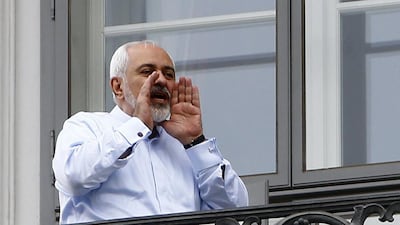As important as it is, the nuclear deal signed last week between Iran and the six world powers must not be overplayed, argued Abdeul Munim Saeed in London-based Asharq Al Awsat.
The nuclear deal has similarities with the 1972 SALT Treaty between the US and the Soviet Union and the 1991 Madrid Peace Conference, the writer said. Both agreements led to important outcomes, but none were deep enough to create historic breakthroughs. No peace has been achieved in the Arab-Israeli conflict and the differences between Washington and Moscow do not seem to be abating.
This will be the fate of the Iranian nuclear deal, Saeed wrote. It must not be overplayed, for it is solely aimed at delaying Iran’s acquisition of nuclear weapons. Iran can claim victory because it has always maintained that its aim was to use its nuclear capability for peaceful purposes under the Nuclear Non-Proliferation Treaty. And the US and its partners can claim victory because Iran has been practically stopped from producing a nuclear bomb, and is being closely watched by the international community.
Yet the fact remains that differences continue to exist between the western world and Iran, just as they do between the West and Russia. The harmony between the permanent members of the UN Security Council and Tehran will soon come to end, with China and Russia going their own way, and the US, UK, France and Germany regrouping under the umbrella of Nato.
Western views that the deal will make Tehran less hostile are overly optimistic, the writer said. But this does not mean that the deal won’t create a special new dynamic.
The writer said the effects of the deal will be felt more in Iran, where a debate will emerge between two groups after the sanctions are lifted. One group will see the deal as an opportunity to achieve some economic growth after many lean years, while the other group will see the unfreezing of $100 billion (Dh37.6bn) in Iranian assets as an opportunity to pursue expansionist and sectarian policies in the region.
The Arab world must carefully evaluate the current situation. A nuclear-free Iran will be less capable of pursuing its regional and international ambitions, the writer said. Also worth noting is that the deal was made while war is raging in Syria, Iraq and Yemen. Through these wars, Iran is seeking to lead the Shiites in the region while ISIL and its affiliates want to lead the Sunnis.
Saeed said the battles in Syria and Yemen would have continued regardless of the deal.
In the London-based daily Al Quds Al Arabi, Saeed Al Shehabi remarked that the nuclear deal has attracted wide regional and global attention. While most of the world has welcomed it, two countries have, for different reasons, opposed it: Saudi Arabia and Israel.
Al Shehabi said that Israel felt threatened because this was the first time since the Islamic revolution that relations between Tehran and the western countries, particularly the US, were heading towards a thaw. For more than three decades, Tel Aviv has benefited greatly from the Iran-West standoff, and this was one reason that westerners were keen to deepen their ties with, and defend, Israel even when it committed atrocities against the Palestinian people.
Concurrently with the break between the Islamic republic and the West, Tehran refused to recognise Israel and openly supported the Palestinian resistance groups. The nuclear agreement can be seen essentially as a foundation for a warming of relations between Tehran and Washington – a prospect that is of great concern to the Israeli leaders because it undermines their role.
A rapprochement with Iran, according to Washington, will not affect the military balance of power in the region. Also, the writer noted, the Obama administration has sought to improve its image in the world by using less hard power, withdrawing from Iraq and Afghanistan, and restoring its relations with Cuba after 50 years.
Writing in Asharq Al Awsat, Tawfiq Alsaif said the deal will eventually be accepted among Iran's various factions because conservatives do not have other options and the reform-leaning government sees it as the bedrock of its policy.
The deal could signal the revival of the reform trend in Iran, especially if the president, Hassan Rouhani, succeeds in reaping stimulating investments and improving living standards. This will undercut the influence of radical religious leaders and the leaders of the Revolutionary Guard, the writer said.
Translated by Abdelhafid Ezzouitni
AEzzouitni@thenational.ae

